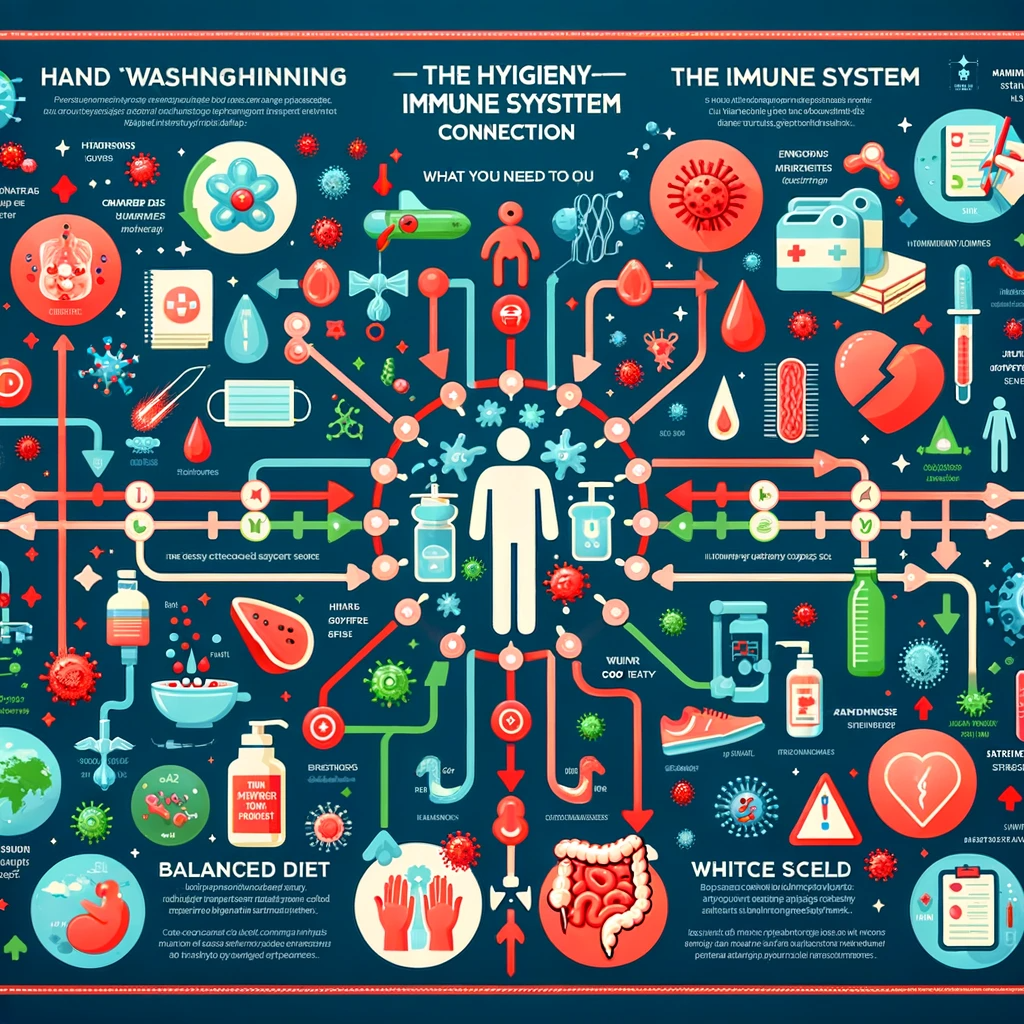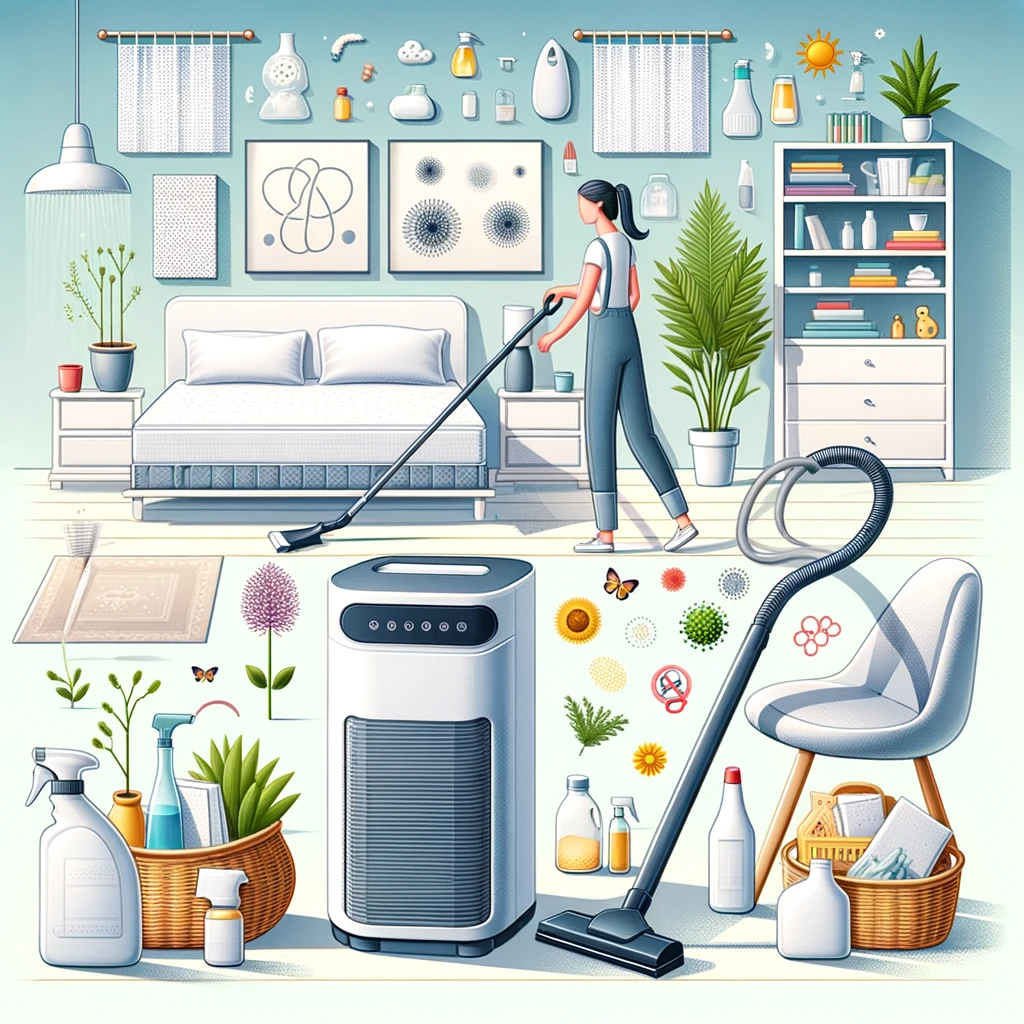Hygiene-Immune System Connection: In today’s health-conscious society, understanding the intricate link between hygiene and immune health is more important than ever. The concept of the “Hygiene-Immune Connection” reveals a fascinating interplay between our daily cleanliness practices and the robustness of our immune system. While maintaining good hygiene is undeniably crucial for preventing illness, it’s equally important to recognize that our immune system’s strength is partly shaped by its exposure to various environmental factors, including microbes. Striking the right balance between cleanliness and healthy microbial exposure is essential for nurturing a resilient immune system. This comprehensive guide delves into the science behind this connection, debunking myths, offering practical advice, and highlighting the latest research to help you make informed decisions for optimal health.
| Category | Tips and Tricks | Details/Explanation |
|---|---|---|
| Hand Hygiene | Frequent Washing | Wash hands regularly with soap and water for at least 20 seconds, especially before eating and after using the restroom. |
| Food Safety | Proper Handling | Store, handle, and cook food properly to avoid foodborne illnesses. Use separate cutting boards for raw meats and vegetables. |
| Personal Hygiene | Routine Maintenance | Regular bathing, brushing teeth twice a day, and changing clothes daily to maintain personal cleanliness. |
| Home Cleanliness | Regular Cleaning | Keep living spaces clean but avoid overuse of antibacterial products. Focus on high-touch areas like doorknobs and countertops. |
| Microbial Exposure | Balanced Approach | Allow some exposure to natural environments, like playing outdoors or having pets, to build a stronger immune system. |
| Diet and Immunity | Nutrient-Rich Foods | Consume a balanced diet with fruits, vegetables, proteins, and whole grains to support immune health. |
| Exercise | Regular Activity | Engage in moderate physical activity regularly to boost the immune system. |
| Sleep Hygiene | Adequate Rest | Ensure 7-9 hours of quality sleep per night to aid immune function and recovery. |
| Stress Management | Relaxation Techniques | Use techniques like meditation, yoga, or deep breathing exercises to manage stress, which can impact immune health. |
| Vaccinations | Stay Up-to-Date | Keep vaccinations current as recommended by healthcare professionals to help the immune system recognize and fight diseases. |
Understanding the Hygiene-Immune Connection: The Basics
The concept of the Hygiene-Immune Connection is grounded in understanding how our hygiene practices impact our immune system. The relationship between cleanliness and our body’s ability to fight diseases is complex and multifaceted.
The Immune System: A Brief Overview
Our immune system is a sophisticated network designed to defend against infections and diseases. It comprises various cells and organs working in harmony to protect the body.
Hygiene Practices and Immune Responses
Regular hygiene practices, such as washing hands and maintaining a clean environment, play a crucial role in preventing the introduction and spread of pathogens that can weaken our immune system.
Myth vs. Reality: Understanding the Balance
It’s essential to balance hygiene practices without overdoing them. Excessive cleanliness can sometimes lead to a less challenged, and potentially weaker, immune system.
The Science Behind How Hygiene Affects Immunity
The Microbial World and Our Immune System
Our bodies host a diverse range of microbes. These microbes, especially those in the gut, are critical in developing and maintaining a healthy immune system.
Hygiene Hypothesis: The Connection Explained
The Hygiene Hypothesis suggests that a lack of exposure to pathogens in early life can lead to an underdeveloped immune system, potentially increasing the risk of allergies and autoimmune diseases.
Modern Research and Developments
Recent studies have explored how different hygiene levels impact immune system development and functionality, shedding light on this complex relationship.
The Role of Vaccinations
Vaccinations are a critical aspect of hygiene-immune connection, training the immune system to recognize and combat specific pathogens effectively.
Debunking Myths: The Real Impact of Hygiene on Your Immune System
Common Misconceptions About Hygiene and Immunity
Explore the common myths surrounding the idea that more hygiene always equates to a stronger immune system, and why these may not be entirely accurate.
The Importance of Balanced Hygiene
Discuss the importance of maintaining balanced hygiene – neither too little nor excessive – for optimal immune function.
Impact of Environment and Lifestyle
Consider how environmental factors and lifestyle choices, beyond just cleanliness, play a significant role in shaping our immune health.
Expert Opinions and Guidance
Refer to expert opinions and medical guidance to provide a well-rounded understanding of the hygiene-immune connection.
Practical Tips: Enhancing Your Immune Health Through Improved Hygiene
Everyday Hygiene Practices for Immune Health
Offer practical and simple hygiene tips that can be incorporated into daily routines to support immune health, such as regular hand washing and oral hygiene.
Diet and Hygiene: The Nutritional Connection
Delve into how diet plays a role in both hygiene (through food safety and preparation) and directly impacting immune health.
Exercise and Immune Function
Discuss the role of physical activity in boosting immune health and how it complements hygiene practices.
Stress Management and Sleep Hygiene
Highlight the importance of managing stress and maintaining good sleep hygiene as critical factors in supporting a healthy immune system.
Hygiene Habits for a Stronger Immune System: Do’s and Don’ts
Establishing Effective Hygiene Routines
Creating a daily hygiene routine is essential for maintaining a healthy immune system. This includes regular hand washing, oral hygiene, and personal cleanliness.
Do’s: Key Hygiene Practices to Adopt
Detail the important hygiene practices to follow, like frequent hand washing, using sanitizers when needed, and keeping your living space clean and free of harmful bacteria.
Don’ts: Hygiene Overkill and its Risks
Discuss the pitfalls of excessive cleanliness, such as the potential for reducing the immune system’s ability to handle minor infections, and the risk of developing allergies.
Balancing Cleanliness and Immune Strength
Provide tips on achieving a balance between maintaining good hygiene and allowing the immune system to interact with a healthy level of microbes.
The Role of Personal Hygiene in Disease Prevention and Immune Function
Personal Hygiene: The First Line of Defense
Explain how basic personal hygiene acts as the first barrier against pathogens, thereby aiding the immune system in disease prevention.
Hand Hygiene and Respiratory Illnesses
Focus on the critical role of hand hygiene in preventing respiratory illnesses and how it supports the immune system’s function.
Impact of Poor Hygiene on Immune Health
Discuss the consequences of poor hygiene habits, such as increased susceptibility to infections and potential long-term effects on immune health.
Educational Initiatives and Public Awareness
Highlight the importance of public health campaigns and education in promoting effective hygiene habits for improved immune function.
How Over-Cleanliness Might Affect Immune System Development
The Concept of Over-Cleanliness
Introduce the idea that an environment that is too sterile might not provide the necessary exposure to microbes that help develop a robust immune system.
Immune System Development in Children
Discuss the critical role of exposure to various microbes in early life in the development of a child’s immune system, referencing the hygiene hypothesis.
Allergies and Autoimmune Diseases: A Link to Cleanliness
Explore the correlation between increased allergies and autoimmune diseases in more sterile environments.
Finding the Right Balance: Recommendations
Provide recommendations on how to strike the right balance between cleanliness and beneficial exposure to microbes, particularly in children’s environments.
Balancing Hygiene and Immune Health: A Comprehensive Guide
Understanding the Balance
Introduce the concept of maintaining a balance between good hygiene practices and a healthy immune system, emphasizing why both are crucial for overall health.
Key Hygiene Practices and Their Impact on Immunity
Detail the specific hygiene practices that are beneficial for immune health, such as proper handwashing, and discuss their direct impact on the immune system.
Avoiding the Extremes: Over-Cleanliness vs. Neglect
Address the extremes of over-cleanliness and neglect, explaining how each can adversely affect immune health, and provide guidance on avoiding these pitfalls.
A Holistic Approach to Health and Hygiene
Present a holistic view, incorporating aspects like diet, exercise, and mental health, and their interplay with hygiene and immune health.
Hygiene-Immune Connection: What Research Says
Exploring Recent Studies
Delve into recent scientific research and studies that have explored the relationship between hygiene and the immune system, providing evidence-based insights.
Emerging Theories in Immune Health
Discuss new and emerging theories in the field of immunology that relate to hygiene, such as the role of microbiomes in immune development.
Debating the Hygiene Hypothesis
Offer a detailed discussion on the Hygiene Hypothesis, presenting various viewpoints and the latest findings that either support or challenge this theory.
Future Directions in Research
Look ahead at the potential future directions of research in the field and what questions remain to be answered about the hygiene-immune connection.
Making the Right Choices: Hygiene Practices for Optimal Immune Health
Daily Hygiene Habits for Better Immunity
Outline daily hygiene habits that can positively impact immune health, emphasizing the importance of consistency and routine.
Role of Environment in Immune Health
Discuss the role that one’s living and working environment plays in immune health, offering tips for maintaining a healthy environment.
Personal Care Products and Immune Function
Examine how various personal care products, such as antibacterial soaps and sanitizers, affect immune function, providing guidelines for their optimal use.
Educating for a Healthier Future
Conclude with the importance of educating the public about the hygiene-immune connection, advocating for informed choices for better long-term immune health.
Final Thoughts
Hygiene-Immune System Connection: The relationship between hygiene and immune health, the “Hygiene-Immune Connection,” is a complex yet vital aspect of our overall well-being. Through this exploration, we’ve uncovered that while maintaining good hygiene is crucial for warding off diseases, an overly sterile environment might not always be beneficial. It’s about finding a balance—embracing cleanliness while also allowing our immune system to interact with the world around us. This guide has provided insights into the science behind this connection, practical tips for everyday life, and a perspective on the myths and realities of hygiene practices. As we continue to navigate the intricacies of our health, understanding and applying the principles of the Hygiene-Immune Connection will play a pivotal role in fostering a stronger, more resilient immune system. Remember, the key to good health lies not just in cleanliness, but in the harmony between our lifestyle choices and our body’s natural defenses.
FAQs
- What is the Hygiene-Immune System Connection?
- The Hygiene-Immune Connection refers to the relationship between our hygiene practices and the functioning of our immune system. It encompasses how cleanliness, or lack thereof, impacts our body’s ability to fight off diseases and infections.
- How does hygiene affect our immune system?
- Good hygiene practices, like hand washing and maintaining a clean environment, help prevent harmful pathogens from entering our body. However, overdoing hygiene can potentially lead to a less challenged immune system, which might affect its ability to respond to infections effectively.
- What is the Hygiene Hypothesis?
- The Hygiene Hypothesis suggests that a lack of exposure to bacteria and other microbes in early childhood can lead to an underdeveloped immune system, possibly increasing the risk of allergies and autoimmune diseases.
- Can being too clean weaken your immune system?
- Yes, being excessively clean can potentially weaken your immune system. Limited exposure to microbes may hinder the development of a robust immune response, especially in children.
- What are the best hygiene practices to boost the immune system?
- The best hygiene practices include regular hand washing, proper food handling and preparation, regular cleaning of living spaces, and personal hygiene routines. However, it’s also important to balance these practices with some exposure to natural environments.
- How important is diet in the Hygiene-Immune System Connection?
- Diet plays a crucial role. A balanced diet rich in nutrients supports both the immune system and a healthy microbiome, which is essential for a strong immune response.
- Should children be exposed to more germs for a stronger immune system?
- Controlled exposure to germs can be beneficial for children’s immune system development. However, it’s important to balance this with good hygiene practices to prevent serious infections.
- What is the role of vaccinations in the Hygiene-Immune System Connection?
- Vaccinations are a critical aspect of this connection. They help the immune system develop resistance to specific diseases in a controlled and safe manner, complementing hygiene practices.
- Can lifestyle changes improve the Hygiene-Immune System Connection?
- Yes, lifestyle changes like regular exercise, stress management, and adequate sleep can significantly improve immune health, complementing good hygiene practices.
- Where can I find more information about the Hygiene-Immune System Connection?
- More information can be found in medical journals, publications from health organizations, and through discussions with healthcare professionals. Staying updated with recent research and guidelines is also beneficial.







